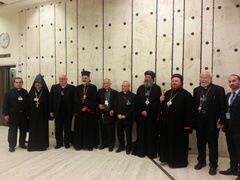|
Archbishop of Mosul: "Recognize genocide against Christians" "We Christians in Iraq have a future if the international community gives us immediate assistance. Don't forget us." With these words the Chaldean Patriarch Mar Louis Raphael I Sako addressed the community of nations on Tuesday while talking to the international Catholic pastoral charity, Aid to the Church in Need. The Patriarch was talking on the occasion of a conference on the question of Christians in the Middle East, which was held with financial support from Aid to the Church in Need on the fringe of the plenary session of the UN Human Rights Council in Geneva. "People are disappointed
how little help has been received to date." The Patriarch continued:
"At present about 120,000 Christians are living in Iraq as refugees. They
need everything because the ISIS terrorists have taken all they had. The
greatest challenge at the present time is the provision of living
accommodation. The winter, which can be very cold in Iraqi Kurdistan, is coming
and the people can't possibly stay in tents. We rely heavily on support
here." In his remarks to the conference participants, Louis Raphael I made
a call to set up a protection zone for Christians in Northern Iraq. This
should, he said, be placed under a United Nations mandate and should be set up
with major involvement of Iraq's neighbor states. "We need a resolution of the United Nations which will enable us to return," the Head of the Chaldean-Catholic Church said. Sako warned that if the Iraqi Christians are not able to return to their places of origin in the Niniveh Plains near Mosul, they will face the fate of the Palestinian refugees, who have lived scattered over many countries. Mosul's Syriac-Orthodox Archbishop Nicodemus Daoud Sharaf said before the conference that the United Nations must recognize and condemn the expulsion of the Christians in Iraq as genocide. "The United Nations is quick to condemn anti-Semitism. We want to see the same when Christians are persecuted." He was pleased about the visits of western politicians to Iraq. "But we need genuine humanitarian aid. Time is a major factor for us. More and more people are leaving the country." The Syriac-Catholic Patriarch Ignace III Yousif Yunan, a resident of Lebanon, also made a call at the conference for a greater commitment on the part of the international community. "With the capture by ISIS of Syriac-Catholic towns such as Qaraqosh, tens of thousands of my faithful are fleeing. Aid from the international community would not only help them materially, but also show them that they are not alone and not forgotten." The Christians of the Middle East were too few and too poor to attract the interest of the industrialized nations, the Church leader continued. Patriarch Ignace also
stressed that in the long term the Christian presence in the Middle East could
only be guaranteed by separating state and religion. "As an international
family we must work towards the separation of state and religion." In this
connection he called on Muslims to reinterpret their Holy Scriptures. "In
the 21st century one cannot make an exegesis as though one were in the 7th
century." Archbishop Sharaf
criticized the inadequate reaction of Muslims to the actions of ISIS.
"When the Mohammed cartoons were published a few years ago in Denmark,
millions of Muslims took to the streets worldwide because this was something
that was against Islam. ISIS is also seen as un-Islamic. But where are the
demonstrations against it?"
With picture of religious delegation at the conference for Christians in the Middle East (© ACN) |
|
|

